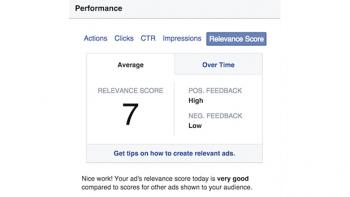Facebook Inroduces “Relevance Score” to Improve Ad Quality
To give you more insight into the performance of your Facebook ads, Facebook has officially introduced the new Ads Relevance Score as a visible metric in the ad reporting tools.
Ads Relevance Score is a metric that provides an estimate of how relevant your ad is to its target audience, on a scale of 1 to 10. For anyone familiar with Google Adwords, it is similar to the Quality Score.
Taking relevance into account helps ensure that people see ads that matter to them, leading to a better experience for people and businesses alike.
How relevance scores works
Relevance score is calculated based on the positive and negative feedback an ad receives from its target audience. Ads receive a relevance score between 1 and 10, with 10 being the highest. The relevance score will only appear once an ad has recieved 500 impressions or more.
The score is updated as people interact and provide feedback on the ad. The more positive interactions, the higher the ad’s relevance score will be. The more times people hide or report an ad, the lower its score will be.
Positive Feedback
A rating based on the number of times your audience took a desired action after seeing your ad, such as shared or liked it, or helped you achieve your objective, such as visiting your website. When positive feedback is high it means people are responding well to your ad.
One of "Low", "Medium", "High" or field is not returned if not enough impressions.
"Low" means (1 <= score <= 2)
"Medium" means (3 <= score <= 6)
"High" means (7 <= score <= 10)
Negative Feedback
A rating based on the number of times your audience hid your ad or otherwise indicated a negative experience such as choosing not to see ads from you. When negative feedback is high it means people don't want to see this ad.
One of "Low", "Medium", "High" or field is not returned if not enough impressions.
"Low" means (1 <= score <= 2)
"Medium" means (3 <= score <= 6)
"High" means (7 <= score <= 10)
Ads with guaranteed delivery — like those bought through reach and frequency — are not impacted by relevance score. Relevance score has a smaller impact on cost and delivery in brand awareness campaigns, since those ads are optimized for reaching people, rather than driving a specific action like installs.
Why Relevance Score Matters
Relevance Score can lower the cost of reaching people. Basically Facebook has said that the higher an ad's relevance score is, the less it will cost to be delivered. Because their ad delivery system is designed to show the right content to the right people, a high relevance score is seen by the system as a positive signal.
Of course, relevance isn't the only factor their ad delivery system considers. Bid matters too. But having strong relevance scores will help advertisers see more efficient delivery through Facebook's system.
Relevance Score can help advertisers test ad creative options before running a campaign. Advertisers can test different combinations of images and text with different audiences, and use relevance score to determine which combinations will work the best. Keep in mind, they will need to get 500 impressions before seeing the Relevance Score, so you will still have to pay to run the ad for a little while to test it.
Relevance Score can help optimize campaigns already in progress. Advertisers can monitor their relevance scores while ad campaigns are running, so if a score begins to dip, they can make appropriate (or test) changes. A lowering score may be an indicator that the ad's images/text or audience needs to be refreshed
The more relevant an ad is to your audience, the better it’s likely to perform. But understand that having a good relevance score is not an end unto itself.
Relevance scores should not be used as the primary indicator of an ad’s performance. The most important factor for success is still bidding based on the business goal you hope to meet with an ad.
Achieving the desired outcome is ultimately more important than your relevance score. If you have an average score but your ad is working, you may not want to change anything. Or you may consider tweaking the ad to see how you can get lower cost of delivery by improving the relevance score. Or you might monitor your relevance score, along with the conversions you’re driving, to learn when it’s time to update your campaign.
While understanding relevance scores has real benefits for advertisers, it’s important to keep this metric in perspective.

